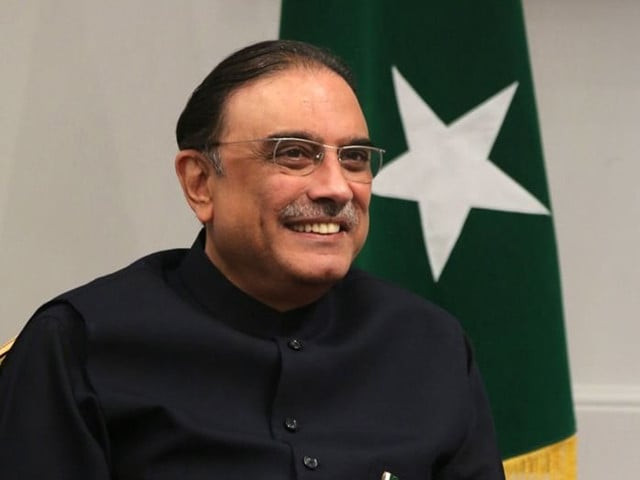President seeks solution to energy costs, capacity payments to IPPs
Zardari proposes FPCCI should form a committee and work with his office to develop a viable solution to IPPs issue

President Asif Ali Zardari called on Thursday for finding a win-win solution to address not only the issue of rising energy costs but of paying capacity charges to the Independent Power Producers (IPPs), conveying he was aware of the problems being faced by people and the business community due to the current energy crisis.
Subsequently, the president proposed that the Federation of Pakistan Chambers of Commerce and Industry (FPCCI) should form a committee and work with the President’s Office to develop a viable solution to the issue of paying capacity charges to the IPPs.
The president gave these remarks while talking to a delegation of FPCCI comprising businessmen and office-bearers of 40 regional business associations, led by former interim commerce minister, Dr Gohar Ejaz, at Aiwan-e-Sadr on Thursday.
While talking to the delegation, President Zardari said that the President’s Office would collaborate with a smaller committee from the business community to find a win-win solution for the government, the people, the business community and IPPs.
President Zardari urged for evolving a consensus solution so that none of stakeholders lose out. An official statement issued after the meeting said that President Zardari was aware of the problems being faced by Pakistani businesses, saying they were in a “triple-whammy” due to high input, energy, and fuel costs.
The statement said that Dr Gohar Ejaz highlighted that rising energy costs were overburdening the people, industry, agriculture and exports sector, emphasising the need for reforming the energy sector to bring down energy prices.
Also read: Capacity charges are just the tip of Pakistan's power sector iceberg
Dr Ejaz requested the president to intervene in the matter and play his role in resolving the issues faced by Pakistan’s industries and businesses due to high electricity prices. The president assured the delegation of his support in coming up with a solution to their problems and taking up the matter with relevant quarters.
The president’s intervention and suggestion has come on the heels of former policy makers, renowned experts and industrialists recommending a series of steps, including parliamentary legislation, slashing taxes and ordering forensic audit of IPPs in a bid to reduce inflated power bills and to avoid further economic chaos triggered by the energy crises.
The experts while taking part in the Grand Debate on Energy Crisis recently held at Express News had warned that further delaying the matter could lead to a situation where system would fall of its own weight.
Currently, the power tariff has almost reached to Rs70 per unit, including capacity payment of Rs24 per unit, leading to mounting discontent over skyrocketing electricity bills couple with runaway inflation.
Since August 2023, nationwide protests and fervent outcry over soaring electricity costs have been taking place in the midst of broader political, economic and constitutional uncertainties. Lately, the discussions on exuberant power tariffs have dominated the social media platforms as well where people are pouring their heart out and urging the rulers to find solutions.
Shocking as it may seem, according to the Private Power Infrastructure Board, Pakistan’s peak demand is roughly 25,000 MW and its generation capacity is about 42,000 MW. Since demand is less than the supply, the government has to pay excess payments to the IPPs. In addition, consumers are burdened with capacity charges because of the transmission and higher loss on theft, among other things.
During the debate, PML-N’s former federal minister for energy Khurram Dastgir had pointed out that the power demand is roughly 12,000 MW in winters while, in summer, it reaches to 32,000 MW, saying capacity payments were needed to fill the gap. “If the parliament scrutinises then chances are that some solution can be found to deal with those contracts,” Dastgir had suggested.
Similarly, Yonus Dagha, former secretary power, had suggested that 15 to 20 per cent decrease can be seen in electricity bills if the government forgoes that Rs25billion, with the consent of IMF.
Ex-SAPM on CPEC Affairs Khalid Mansoor while referring to a report of NEPRA issued in July 2023 said that 45 per cent of capacity payment goes to government-run power plants followed by 40 per cent to plants established under CPEC and 15 per cent to private IPPs, totaling a capacity payment of Rs1.954 trillion, “half of which goes to government of Pakistan.”
Suggesting a solution, Mansoor had said that electricity theft causes a loss of just over 6.4 per cent and translates into an impact of Rs3 per unit while the transmission and distribution losses cause an impact of 17 per cent and translates into Rs7 per unit, saying Rs11 relief can be provided by just handling these two things.
Arshad Abbasi, an energy expert, had revealed that that idle capacity payment was increased from 60 per cent to 85 per cent via the 2015 energy policy, which was being criticised now. Commenting on the flaws in different policies, Abbasi said that the planning commission, bureaucracy and NEPRA needed to learn from past’s mistakes but it seems they haven’t.



















COMMENTS
Comments are moderated and generally will be posted if they are on-topic and not abusive.
For more information, please see our Comments FAQ